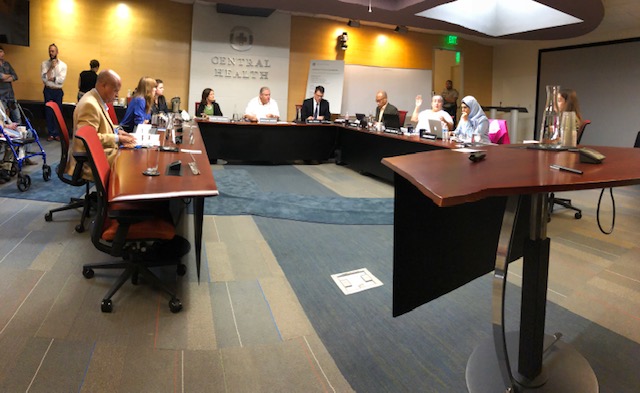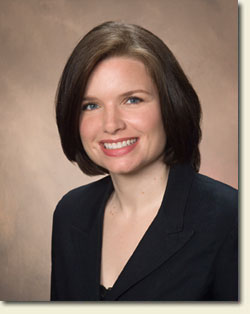Story update: The Travis County Commissioners Court at 12:32pm Tuesday September 25, 2018, voted 5-0 to approve Central Health’s FY19 budget and tax rate.
That provides Central Health with the resources needed to proceed with plans to move sick clients now receiving healthcare services through the Medical Access Program to be insured by Sendero Health Plans Inc. MAP clients would have to voluntarily make the decision to receive care through Sendero’s network of providers. Central Health will pay the insurance premiums for those who opt to be covered by Sendero.
A proposal to monitor progress going forward triggered vote to give Sendero another year
Part 14 in a Series
Posted Monday September 24, 2018 3:39pm
Updated Tuesday September 25, 2018 2:04pm
—-
“This is the face of a person who will die,” Alex Berek told Central Health’s Board of Managers, pointing his forefinger at his face while supporting himself with a walker.
Berek was one of the 32 people who addressed the board at a special-called meeting Saturday September 22 during citizens communication that lasted more than an hour and a half. Many who spoke told their stories of pain, suffering, and near-death lifesaving healthcare they had received as a member of Sendero Health Plans Inc.
“Sendero gives me medications that would cost $400 a month. I can’t afford that,” Berek said. “I have a fatal disease. If I can’t get my meds I’m dead. I don’t want to die. I’m the one who’s going to suffer (if Sendero is not continued). “I want to be here a little longer. If you say no, I’m dead.”
Five and a half hours after the meeting began, and after a lengthy debate among the managers in which the word “difficult” was repeated ad infinitum to describe their decision-making, the board voted to continue supporting Sendero for another year—but with built-in milestones to monitor progress and an understanding that if those milestones were not met, then the nonprofit health insurance company with 24,000 members would not get another chance.
Managers Cynthia Valadez and Julie Oliver made passionate appeals to continue Sendero operations, but Managers Katrina Daniel and Sherri Greenberg were unmoved, initially. The debate shifted, however, when Manager Shannon Jones proposed to continue Sendero but with strict conditions he had written before the meeting started.
After an hour-long recess in which attorney Holly Gummert drafted a motion based on the conditions offered by Jones, the Board of Managers reconvened. Copies of the draft were distributed and within 10 minutes the managers voted. Of the eight managers present, seven voted aye. Manager Charles Bell, who is on Sendero’s board, abstained. Manager Abagail Aiken was absent. (A copy of the motion is linked at the bottom of this story.)
That was a complete change of heart for Managers Daniel, Greenberg, Jones, and Maram Museitif, who at the September 12 board meeting had voted to wind down Sendero.
Funding comes with conditions
The approved motion included approval of $6 million to pay the insurance premiums for patients voluntarily moved from the Medical Access Program to Sendero’s insurance. But the money is not to be spent until Central Health’s president and CEO, Mike Geeslin, has presented a viable strategy with “explicit outcome measures and objectives.” Reports on progress in attaining those objectives are to be presented to the board at least quarterly. By no later than June 2019, a third-party actuarial report is to be provided to the board to “inform potential wind-down or continuation” of Sendero.
Further, if the goals are not met by June 2019, the board may adopt a resolution expressing its intent to cap future funding for Sendero. It also will cap premium assistance funding in future years to no more than $8 million.
That was a far different decision than the one the managers arrived at September 12 at 10pm with no public input. The agenda item that night gave no indication that the managers might wind down Sendero and force its 24,000 members to choose other health insurance, possibly at a higher cost or with fewer providers in its network. Yet managers voted 4-3 that night to do just that.
The resulting outcry caused the Travis County Commissioners Court on September 18 to delay its decision to approve Central Health’s FY19 budget and tax rate and instead order Central Health to reconsider its decision.
Tomorrow the Commissioners Court will vote on the budget and tax rate (Items 50 and 51 on the agenda) and are likely to approve it without opposition.
Debate led to the new decision

Sitting in that room and observing eight volunteer, unpaid board members debating at length was a refreshing change. Previously those discussions had taken place in closed-door executive sessions. Although Sendero is a nonprofit, it competes in the health insurance market with a number of for-profit insurers who have far larger memberships. Hence the need for protecting the privacy of its plans.

Referring to what some have characterized as Sendero’s “losses” because Central Health has had to continue pumping money into it, Manager Katrina Daniel said, “I don’t like that characterization of ‘losses.’ We didn’t lose the money. It went to healthcare.
“The question is it a sustainable and predictable way to fund healthcare?” Daniel said.
She said that Seton currently bears the cost of in-hospital care for Medical Access Program (MAP) patients. She said if the sickest MAP patients are moved to Sendero, then costs of in-hospital care will also shift to Sendero and ultimately to Central Health for financial responsibility. “I don’t think that’s sustainable,” she said.
Manager Julie Oliver responded, saying, “I couldn’t disagree with you more.” She said the actuarial reports that show that with 200 to 500 of the sickest MAP patients moved to Sendero, money drawn from the risk pool would more that offset the in-hospital costs now borne by Seton. “We have fiduciary responsibility to draw down that money.”
Otherwise, she said, 24,000 Sendero members would be left without a healthcare insurance option because the private insurers “are not affordable.”
She turned to look at Manager Jones and said, “Mr. Jones, please reconsider. We’ve never been given this option before.”

Manager Cynthia Valadez said if the sickest MAP patients had been moved to Sendero in 2017, “We would not be having this discussion today. We wouldn’t be in this meeting, and Sendero wouldn’t be in this position.”
She said that winding down Sendero would force many into bankruptcy. “There are overwhelming humane, ethical and moral reasons to continue the life of Sendero Health Plans,” Valadez said.
Drawing one of the few laughs in an otherwise serious debate, Valadez said, “I was so desperate that I said if it doesn’t work out I’ll keep my big mouth shut. That’s a miracle.”
“I’m begging you,” Valadez said. “Please change your vote. Just one more year. I don’t believe we’ll have another opportunity like this.”

Manager Sherri Greenberg was unmoved by Valadez’s pleas. She said, the “deck is stacked against” Sendero, due to factors beyond its control, including the state’s failure to expand Medicaid and the state’s low reimbursement rates. “Healthcare in the United States is broken,” she said.
Manager Charles Bell, MD, is a member of Sendero’s board of directors and does not vote regarding its funding. But he was invited to speak in the debate about its future.
“Based on the information we have received and all the scenarios we’ve looked at, it is possible—possible because there will still be a lot of risk, risk that we cannot predict, uncertainty,” Bell said. “We may be able to get through till 2020 and get the risk adjustment (funding) from the risk pool, if everything is perfect. If not then we can talk about how we safely can wind down.”
“Your funding decisions will decide what our (Sendero board) business decisions have to be,” Bell said. “It’s your decision to move sick patients. It’s not Sendero’s decision. If you give us enough funds, we’ll see what FY19 will bring.”
It was at that point that Manager Jones laid out his proposal to fund Sendero for another year but with conditions.

Manager Maram Museitif said that events of recent days had led “me to have second thoughts on the decision I’d probably make associated with moving forward or ending the (Sendero insurance) plan. There’s a lot of risk either way. But perhaps I will echo Mr. Jones and give it another rear and if it fails then, you have to move forward. If successful it gives Sendero the capital to move forward.”
Daniel said of the open debate, “This is democracy at work” and indicated her shift to support the Jones’s proposal.

Guadalupe Zamora, MD, board chair, who had remained silent throughout the long discussion, finally spoke to praise the other managers. “This board has passion, they’re incredible people,” he said. “You won’t get that compassion from elected officials.”
After the meeting, Alex Berke was leaning on his walker and pushing toward the door to leave. His only comment was, “That’s a big relief.”
Link:
Motion to continue funding for Sendero Health Plans, September 22, 2018 (1 page)
Related Bulldog coverage:
Central Health Managers Ethics Questioned: Two members who voted against winding down Sendero Health Plans may not get to vote again, September 21, 2018
Last-Ditch Effort to Save Sendero: Travis County Commissioners Court asks Central Health to reconsider its decision to wind down, Part 12 in a Series, September 20, 2018
Board to Sendero: Drop Dead: Wind-down order despite professional advice that moving sick patients would stabilize finances, Part 11 in a Series, September 17, 2018
Sendero Turnaround Plan in Limbo: Sendero Health Plans has an attractive turnaround strategy but it’s not clear Central Health will commit, Part 10 in a Series, September 9, 2018
Central Health Hears Budget Feedback: Live audience interacts with slide show, answers questions via electronic polling, Part 9 in a Series, August 3, 2018
No-Bid Brackenridge Lease Approved: Two blocks of the 14.3-acre campus tract leased to limited partnership that won’t profit, Part 8 in a Series, July 17, 2018
Central Health Sponsorships Top $200,000: New spending adds $88,000 to the total having no connection to indigent healthcare, Part 7 in a Series, May 2, 2018
Dining and Shining on Taxpayer Dollars: Central Health spent more than $111,000 for sponsorships that have nothing to do with providing indigent healthcare, Part 6 in a Series, March 30, 2018
Central Health’s Checkup Delivered: Consultants delivered performance review completed eight months after contract let, Part 5 in a Series, February 14, 2018
Lawsuit Challenges Central Health Spending: Plaintiffs argue it is not legal to give $35 million a year to the UT Austin Dell Medical Center, Part 4 in a Series, October 18, 2017
Critic: Proposed Financial Policies “’Pointless’: Commissioners Court will vote tomorrow on Central Health financial policies for FY 18, Part 3 in a Series, October 9, 2017
Central Health Financial Policies Hotly Debated: $185 million given to Dell Medical School and Seton, with little to show for indigent healthcare, and $55 million more is on the way for FY 2018, Part 2 in a Series, September 29, 2017
Central Health Feedback Meetings Ill-Attended: Two public forums to gather opinions about the agency drew just nine speakers, Part 1 in a Series, August 27, 2017
Trust indicators:
 Ken Martin has been covering local government and politics in the Austin area since 1981. See more on Ken on the About page.
Ken Martin has been covering local government and politics in the Austin area since 1981. See more on Ken on the About page.
Email [email protected]. This is his 14th article about Central Health and indigent healthcare arising out of his ongoing investigation that begin in early 2017.
Who funds this work? This report was made possible by contributions to The Austin Bulldog, which operates as a 501(c)(3) nonprofit for investigative reporting in the public interest. You can help support this independent coverage by making a tax-deductible contribution.
An alphabetic list of donors who have contributed to The Austin Bulldog since the organization was formed in 2009 and the cumulative amount each person has given through August 28, 2018, are listed on the Contribute page.







